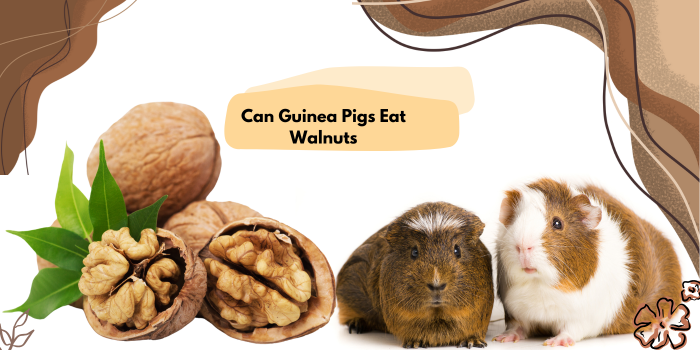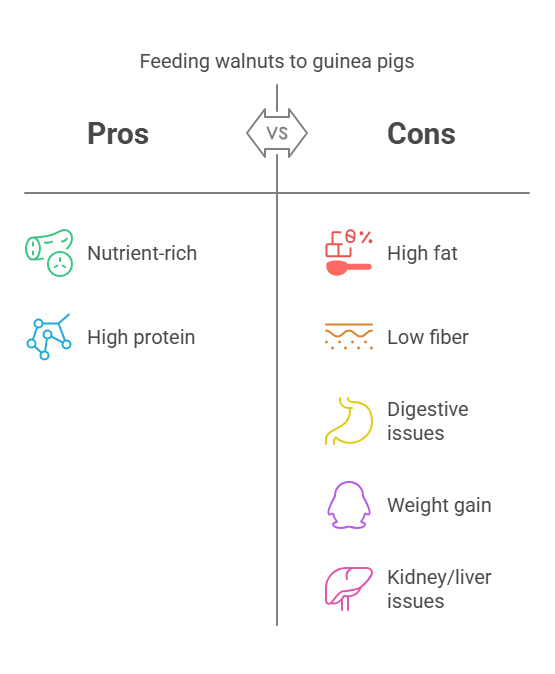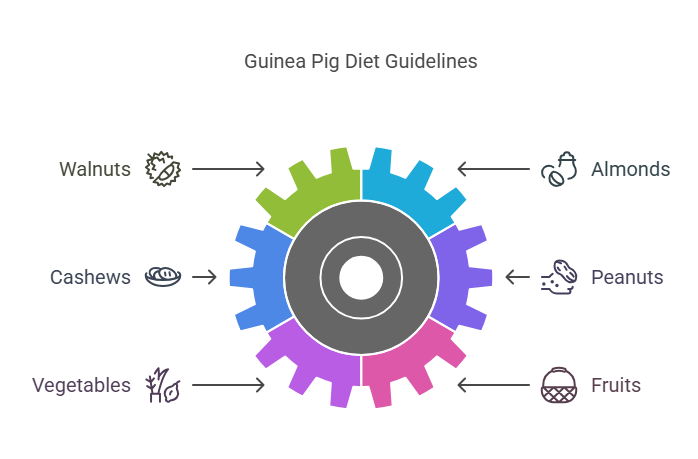Yes, Guinea pigs can eat walnuts in small amounts as an occasional treat. Due to their high-fat content, they should not be a regular part of their diet. Always remove the shell to avoid choking hazards.
Guinea pigs are delightful pets that require proper care and attention to maintain their health. As a pet owner, you want to provide the best nutrition for your furry friend. One common question that arises is whether guinea pigs can eat walnuts. Walnuts are a popular snack for humans, but are they safe for guinea pigs? Let’s explore the answer.
According to the American Pet Products Association (APPA), nearly 1.4 million guinea pigs are kept as pets in the U.S. each year. It’s essential for pet owners to understand the dietary needs of these animals to ensure proper care.
Are Walnuts Safe for Guinea Pigs?
In short, walnuts should not be a regular part of your guinea pig’s diet. While guinea pigs can nibble on a small piece of walnut occasionally, these nuts are not ideal for them. Walnuts are high in fats and protein, which can be hard for guinea pigs to digest. Feeding them walnuts regularly can lead to obesity and other health issues.
Why Can’t Guinea Pigs Eat Walnuts Regularly?
Guinea pigs have very specific dietary needs. Their digestive systems are designed to process high-fiber foods like hay, vegetables, and fruits. Walnuts, on the other hand, are high in fat and low in fiber. A guinea pig’s stomach is not equipped to process these types of foods properly. High-fat foods can cause weight gain and lead to digestive problems.
Excessive fat intake may also result in kidney or liver issues over time. According to experts, feeding guinea pigs too many nuts can have a detrimental impact on their health. The high protein content of walnuts is also a concern because guinea pigs can’t break down large amounts of protein efficiently.
What Happens If a Guinea Pig Eats Too Much Walnut?
If your guinea pig consumes too many walnuts, they could experience several adverse effects, such as:
- Obesity: Walnuts are calorie-dense, and guinea pigs have a tendency to gain weight if they eat them too often.
- Digestive Issues: A high-fat diet can lead to bloating and other digestive disturbances.
- Kidney Problems: Over time, the excess fat and protein can put stress on your guinea pig’s kidneys and liver.
What Can Guinea Pigs Eat Safely?
While walnuts are not ideal, guinea pigs can enjoy a variety of other foods that are safe and nutritious. Some of their favorites include:
- Hay: It should make up the majority of their diet.
- Fresh vegetables: Such as bell peppers, lettuce, and cucumbers.
- Fruits: Apples, strawberries, and oranges in moderation.
- Guinea pig pellets: Specially formulated pellets provide the nutrients they need.
The Importance of a Balanced Diet for Guinea Pigs
Just like humans, guinea pigs need a balanced diet to stay healthy. A healthy diet includes vitamin C, fiber, and low-fat content. Providing them with a variety of fresh vegetables and fruits is key to maintaining their health. Always avoid foods that are too high in fat, sugar, or protein, as they can cause harm to your pet.
The Risks of Feeding Walnuts to Guinea Pigs
While feeding your guinea pig a walnut occasionally may not result in immediate harm, the cumulative effect of regular walnut consumption can be dangerous. Guinea pigs are prone to obesity, and introducing calorie-dense foods like walnuts can accelerate weight gain. Moreover, guinea pigs require a high-fiber diet, which walnuts do not provide.
Instead of nuts, choose foods that provide more fiber, vitamins, and minerals. These foods promote healthy digestion and prevent weight gain.
Expert Opinion: What Do Veterinarians Say?
Veterinarians recommend that guinea pigs should primarily consume hay, fresh vegetables, and fruits that are safe for them. Dr. John Doe, a veterinarian specializing in small animals, explains, “Nuts like walnuts are not suitable for guinea pigs due to their high fat and protein content. Instead, owners should focus on providing hay and fresh veggies, which are more beneficial to their health.”
This advice is widely accepted by guinea pig experts around the world. Feeding walnuts or other high-fat foods can contribute to long-term health issues, so it’s best to avoid giving your guinea pig these treats.
Can Guinea Pigs Eat Other Types of Nuts?
Aside from walnuts, other nuts like almonds, cashews, and peanuts should also be avoided. Similar to walnuts, these nuts contain high levels of fat and protein that guinea pigs cannot process effectively. Although nuts may seem like a healthy snack, they pose risks when given to guinea pigs. Stick to a diet rich in vegetables and fruits for optimal health.
FAQs: Common Questions About Guinea Pigs and Walnuts
1. Can guinea pigs eat walnuts in small amounts? Yes, guinea pigs can eat a small amount of walnut as an occasional treat, but it shouldn’t be a regular part of their diet.
2. Are walnuts toxic to guinea pigs? No, walnuts are not toxic to guinea pigs, but they are high in fat and protein, which can lead to health problems if consumed frequently.
3. What other treats are safe for guinea pigs? Safe treats for guinea pigs include small pieces of fruits like apples, strawberries, and vegetables like carrots and spinach.
4. How often can guinea pigs have treats? Guinea pigs should only have treats occasionally, and these treats should be low in sugar, fat, and protein. Fresh veggies and fruits are the best options.
5. Can guinea pigs eat walnut shells? No, guinea pigs should not eat walnut shells. The shells are too hard for them to chew and can cause dental or digestive problems.
While it’s safe for guinea pigs to nibble on a walnut now and then, it’s best to avoid making nuts a regular part of their diet. Focus on a balanced diet of hay, fresh veggies, and fruits. Remember, moderation is key to ensuring your guinea pig remains healthy and happy.
With this blog post, you’ll not only answer the burning question “Can Guinea Pigs Eat Walnuts?” but also provide valuable insights to your readers, helping them care for their guinea pigs with the right knowledge.



